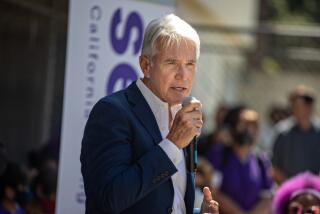An Abuse Compounded
- Share via
To add insult to injury, the top federal officials responsible for the harsh and patently unjust treatment endured for more than nine months by Wen Ho Lee have brushed aside the consequences of their abuse of power. In spite of U.S. District Judge James A. Parker’s apology to Lee after he set him free this week, Atty. Gen. Janet Reno, Energy Secretary Bill Richardson and FBI Director Louis J. Freeh all insist, in so many words, that the extraordinary pressure put on Lee--denial of bail, solitary confinement, shackles, even the bogus threat that he faced execution if convicted--was justified by the need to win his cooperation in their security investigation. Parker bought none of this. Neither should anyone else.
President Clinton, constrained from commenting on the case while it was underway, says he “always had reservations about the claims that were being made denying [Lee] bail.” That is something less than a ringing vote of confidence in the Justice Department and the FBI. It also echoes Parker’s conclusion in court this week. The judge apologized to Lee for having been “led astray”--a polite way of saying deceived--by executive branch officials. The government had argued that if bail were granted to Lee, a former Los Alamos National Laboratory scientist, he might flee the country, taking with him information that could cause the deaths of “hundreds of millions” of people. It turned out that nearly all of that information was in the public domain and hadn’t even been classified secret at the time Lee downloaded it into his computer.
The lasting harm done by this case remains to be determined. Morale at the national laboratories, where work on nuclear weapons is done, is known to have plunged, especially among Asian scientists who believe they are under suspicion simply because of their race. That is grossly unfair to individuals and harmful to the nation. A high percentage of science and engineering doctorates awarded in the United States goes to people born abroad. The need for their talents, in government service and in the private sector, must not be underestimated.
The zeal with which the Justice Department and FBI pursued Lee, even after concluding he had not engaged in espionage for China, awaits explanation. In court this week Judge Parker regretted that resolution of the case prevents him from seeing the classified government documents he had sought that could shed light on the government’s reasons for focusing on the Taiwan-born naturalized citizen. This of course isn’t the first time the FBI has embarrassed itself by chasing the wrong suspect; Richard Jewell, identified through a leak as the FBI’s prime suspect in the 1996 Atlanta Olympics bombing case but later cleared, can attest to that. But even without seeing the government files, Parker knows enough to issue a somber warning to all Americans: “The executive branch has enormous power, the abuse of which can be devastating to our citizens.”
More to Read
Sign up for Essential California
The most important California stories and recommendations in your inbox every morning.
You may occasionally receive promotional content from the Los Angeles Times.













